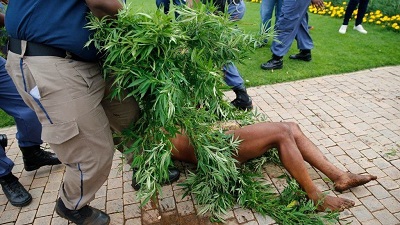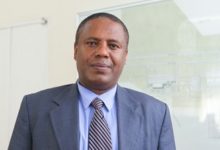
South African police have uprooted several cannabis plants growing near President Cyril Ramaphosa’s office in Pretoria.
They belonged to activists from the indigenous Khoisan community, some of whom have camped in the area for three years.
Their leader, who calls himself King Khoisan, clung on to a large cannabis plant as police dragged him away.
“Police… you have declared war,” the AFP news agency quotes him as shouting.
“We have been here peacefully. We are coming for you,” he continued.
He has since been arrested.
He and some fellow activists were detained for “dealing in dagga (cannabis), illegal plantation and cultivation of dagga, as well as failure to wear a face mask in public when ordered to do so by a police officer,” a statement to AFP said.
In 2018, the group set up camp on the green space outside the president’s office, near a giant statue of Nelson Mandela to campaign for the official recognition of their language.
King Khoisan’s wife expressed anger about the incident in an interview with South Africa’s IOL news site.
“I am very, very cross,” Queen Cynthia said. “The president don’t want to come,” to talk to them, she said. She told IOL the Khoisan people just want acknowledgement.
People had been using the plants for medical reasons, such as cancer and high blood pressure, she continued. The cannabis had been planted in a vegetable garden.
The personal use of cannabis in private places was decriminalised in South African in 2018.
The Khoisan are South Africa’s oldest inhabitants but now form a small minority in the country.
Katrina Esau is working hard to save the language of her childhood from dying out.
At 84, Ms Esau is one of the last three fluent speakers of N|uu, one of the languages spoken by South Africa’s San community, also known as Bushmen.
N|uu is considered the original language of southern Africa.
With no other fluent speakers in the world apart from this family, the language is recognised by the United Nations (UN) as “critically endangered”.
“When I was a child, I only spoke N|uu and I heard a lot of people speaking the language. Those were good times, we loved our language but that has changed,” says Ms Esau in Upington, a town in the Northern Cape Province. -AFP






